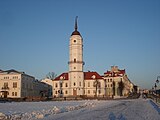Portal:Belarus
Portal maintenance status: (June 2018)
|
| Welcome to the Belarus Portal |
 |
 |

| |
Belarus, officially the Republic of Belarus, is a landlocked country in Eastern Europe. It is bordered by Russia to the east and northeast, Ukraine to the south, Poland to the west, and Lithuania and Latvia to the northwest. Belarus spans an area of 207,600 square kilometres (80,200 sq mi) with a population of 9.1 million, The country has a hemiboreal climate and is administratively divided into six regions. Minsk is the capital and largest city; it is administered separately as a city with special status.
Between the medieval period and the 20th century, different states at various times controlled the lands of modern-day Belarus, including Kievan Rus', the Principality of Polotsk, the Grand Duchy of Lithuania, the Polish–Lithuanian Commonwealth, and the Russian Empire. In the aftermath of the Russian Revolution in 1917, different states arose competing for legitimacy amid the Civil War, ultimately ending in the rise of the Byelorussian SSR, which became a founding constituent republic of the Soviet Union in 1922. After the Polish-Soviet War (1918–1921), Belarus lost almost half of its territory to Poland. Much of the borders of Belarus took their modern shape in 1939, when some lands of the Second Polish Republic were reintegrated into it after the Soviet invasion of Poland, and were finalized after World War II. During World War II, military operations devastated Belarus, which lost about a quarter of its population and half of its economic resources. In 1945, the Byelorussian SSR became a founding member of the United Nations, along with the Soviet Union. The republic was home to a widespread and diverse anti-Nazi insurgent movement which dominated politics until well into the 1970s, overseeing Belarus' transformation from an agrarian to industrial economy.
The parliament of the republic proclaimed the sovereignty of Belarus on 27 July 1990, and during the dissolution of the Soviet Union, Belarus gained independence on 25 August 1991. Following the adoption of a new constitution in 1994, Alexander Lukashenko was elected Belarus's first president in the country's first and only free election after independence, serving as president ever since. Lukashenko heads a highly centralized authoritarian government. Belarus ranks low in international measurements of freedom of the press and civil liberties. It has continued a number of Soviet-era policies, such as state ownership of large sections of the economy. Belarus is the only European country that continues to use capital punishment. In 2000, Belarus and Russia signed a treaty for greater cooperation, forming the Union State. (Full article...)

The Russia–Belarus energy dispute began when Russian state-owned gas supplier Gazprom demanded an increase in gas prices paid by Belarus, a country which has been closely allied with Moscow and forms a loose union state with Russia. It escalated on 8 January 2007, when the Russian state-owned pipeline company Transneft stopped pumping oil into the Druzhba pipeline which runs through Belarus because Belarus was siphoning the oil off the pipe without mutual agreement.
On 10 January, Transneft resumed oil exports through the pipeline after Belarus ended the tariff that sparked the shutdown, despite differing messages from the parties on the state of negotiations. (Full article...)
Alexander Grigoryevich Lukashenko (also transliterated as Alyaksandr Ryhoravich Lukashenka; born 30 August 1954) is a Belarusian politician who has been the president of Belarus since the office's establishment in 1994, making him the current longest-serving head of state in Europe.
Before embarking on his political career, Lukashenko worked as the director of a state farm (sovkhoz) and served in both the Soviet Border Troops and the Soviet Army. In 1990, Lukashenko was elected to the Supreme Soviet of the Byelorussian Soviet Socialist Republic. Following the dissolution of the Soviet Union, he assumed the position of head of the interim anti-corruption committee of the Supreme Council of Belarus. In 1994, he won the presidency in the country's inaugural presidential election after the adoption of a new constitution. (Full article...)

Lua error in Module:Selected_recent_additions at line 69: bad argument #1 to 'gmatch' (string expected, got nil).
Template:/box-header Template:/Featured articles
Template:/box-header Template:/Related portals
The page "Portal:Belarus/box-header" does not exist. The page "Portal:Belarus/Did you know/8" does not exist.

<categorytree depth="1">Belarus</categorytree>
Template:/box-header Template:/New article announcements
The following Wikimedia Foundation sister projects provide more on this subject:
-
Commons
Free media repository -
Wikibooks
Free textbooks and manuals -
Wikidata
Free knowledge base -
Wikinews
Free-content news -
Wikiquote
Collection of quotations -
Wikisource
Free-content library -
Wikiversity
Free learning tools -
Wikivoyage
Free travel guide -
Wiktionary
Dictionary and thesaurus
































